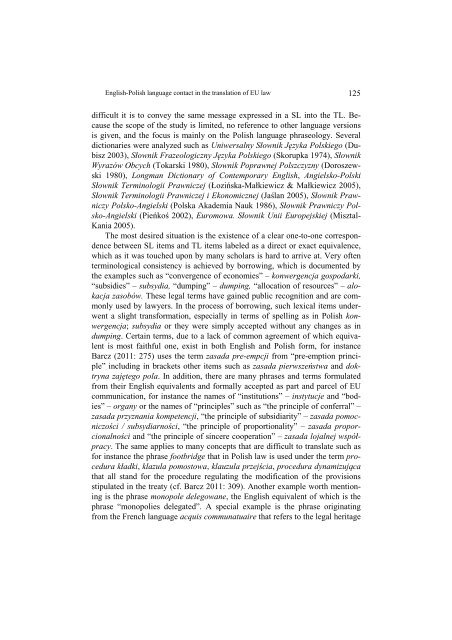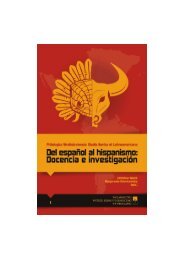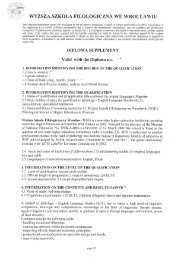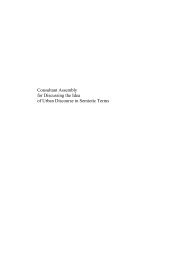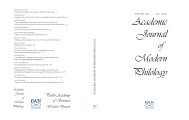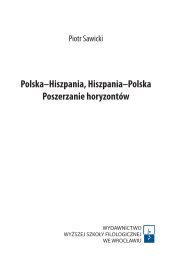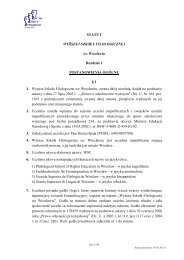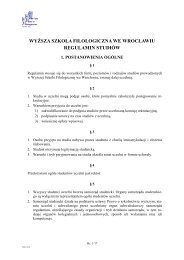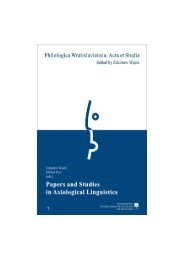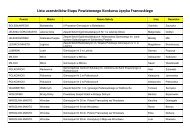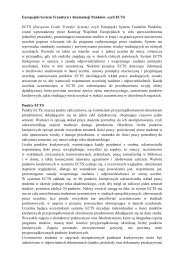s - Wyższa SzkoÅa Filologiczna we WrocÅawiu
s - Wyższa SzkoÅa Filologiczna we WrocÅawiu
s - Wyższa SzkoÅa Filologiczna we WrocÅawiu
You also want an ePaper? Increase the reach of your titles
YUMPU automatically turns print PDFs into web optimized ePapers that Google loves.
English-Polish language contact in the translation of EU law 125<br />
difficult it is to convey the same message expressed in a SL into the TL. Because<br />
the scope of the study is limited, no reference to other language versions<br />
is given, and the focus is mainly on the Polish language phraseology. Several<br />
dictionaries <strong>we</strong>re analyzed such as Uni<strong>we</strong>rsalny Słownik Języka Polskiego (Dubisz<br />
2003), Słownik Frazeologiczny Języka Polskiego (Skorupka 1974), Słownik<br />
Wyrazów Obcych (Tokarski 1980), Słownik Poprawnej Polszczyzny (Doroszewski<br />
1980), Longman Dictionary of Contemporary English, Angielsko-Polski<br />
Słownik Terminologii Prawniczej (Łozińska-Małkiewicz & Małkiewicz 2005),<br />
Słownik Terminologii Prawniczej i Ekonomicznej (Jaślan 2005), Słownik Prawniczy<br />
Polsko-Angielski (Polska Akademia Nauk 1986), Słownik Prawniczy Polsko-Angielski<br />
(Pieńkoś 2002), Euromowa. Słownik Unii Europejskiej (Misztal-<br />
Kania 2005).<br />
The most desired situation is the existence of a clear one-to-one correspondence<br />
bet<strong>we</strong>en SL items and TL items labeled as a direct or exact equivalence,<br />
which as it was touched upon by many scholars is hard to arrive at. Very often<br />
terminological consistency is achieved by borrowing, which is documented by<br />
the examples such as “convergence of economies” – kon<strong>we</strong>rgencja gospodarki,<br />
“subsidies” – subsydia, “dumping” – dumping, “allocation of resources” – alokacja<br />
zasobów. These legal terms have gained public recognition and are commonly<br />
used by lawyers. In the process of borrowing, such lexical items under<strong>we</strong>nt<br />
a slight transformation, especially in terms of spelling as in Polish kon<strong>we</strong>rgencja;<br />
subsydia or they <strong>we</strong>re simply accepted without any changes as in<br />
dumping. Certain terms, due to a lack of common agreement of which equivalent<br />
is most faithful one, exist in both English and Polish form, for instance<br />
Barcz (2011: 275) uses the term zasada pre-empcji from “pre-emption principle”<br />
including in brackets other items such as zasada pierwszeństwa and doktryna<br />
zajętego pola. In addition, there are many phrases and terms formulated<br />
from their English equivalents and formally accepted as part and parcel of EU<br />
communication, for instance the names of “institutions” – instytucje and “bodies”<br />
– organy or the names of “principles” such as “the principle of conferral” –<br />
zasada przyznania kompetencji, “the principle of subsidiarity” – zasada pomocniczości<br />
/ subsydiarności, “the principle of proportionality” – zasada proporcionalności<br />
and “the principle of sincere cooperation” – zasada lojalnej współpracy.<br />
The same applies to many concepts that are difficult to translate such as<br />
for instance the phrase footbridge that in Polish law is used under the term procedura<br />
kładki, klazula pomostowa, klauzula przejścia, procedura dynamizująca<br />
that all stand for the procedure regulating the modification of the provisions<br />
stipulated in the treaty (cf. Barcz 2011: 309). Another example worth mentioning<br />
is the phrase monopole delegowane, the English equivalent of which is the<br />
phrase “monopolies delegated”. A special example is the phrase originating<br />
from the French language acquis communatuaire that refers to the legal heritage


